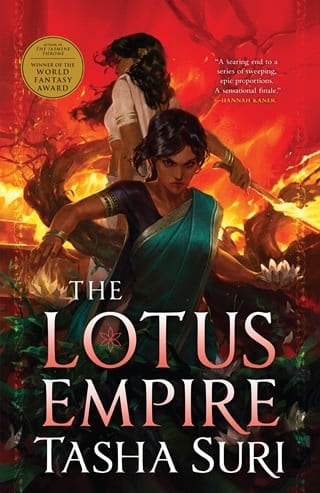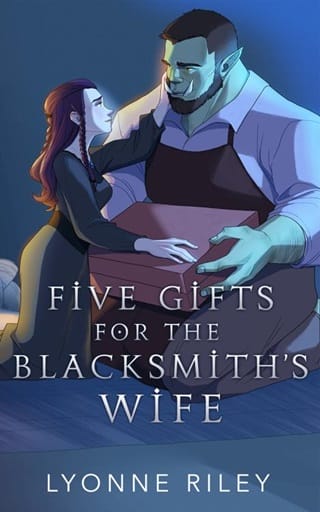Chapter 20 Arahli Ara
ARAHLI ARA
Taru Ara called to him through flowers. She seeded datura blossoms across the walls of the Hirana and the mahal, flashes of white at the periphery of his vision. One pointedly, viciously, grew its way through his right palm. It grew through blackened, its petals dying. He felt her in them. He understood.
You , her blooms said. Secretly. Not the others.
He drifted easily from the others. They were distracted with exultation. Priya had spoken their names; Priya had wielded Mani Ara’s voice, a lustrous pearl in the ugly shell of her body. While they celebrated, he followed the sound of his kin. Taru Ara was crying pitifully: a sawing of wood sound, a creaking branch in a high wind.
He found her on a veranda carpeted in vines. She lay curved on her side, torso bared to the sunlight. Her cries eased as she felt him approach, as his leaves shadowed the curve of her body, where her wound lay.
Her stomach was seared. The burn upon it was a hole the size of a fist, blistered with heat and pus and the livid quality of mortal flesh. He lowered a hand to it.
“When I fought the Parijatdvipans,” she said, voice still reed thin, “they caught me with flame. The flame was nothing, and yet it caught me.”
“You concealed this,” he murmured. “Why?”
“Our kin wouldn’t understand. They would be afraid.” Or they would think me weak , Taru didn’t say. But Arahli Ara knew her nature and the harshness of their kin.
“And you think I understand?”
Her neck twisted. She gazed up at him.
“The remains of Sanjana must be inside me,” she said, as he felt the contours of the wound. “Rotting me from the inside. You need to tell me how you laid Ashok aside. I cannot carry this upon me.”
“Ashok fell away naturally, in time,” Arahli Ara replied. A shudder ran through him as he recalled how untrue that claim was. Ashok clung to him still in so many small ways.
She heaved a breath, her chest rising and falling, then turned her head. “What do I feel, Arahli?”
Ashok’s memories surged through him. This, Ashok had known.
“Pain,” he said.
“I don’t remember pain,” she said, staring uncomprehending at her stomach. “Last time, when we were forced to burn by the Parijati woman, when we crept beneath the earth, when Ahiranya’s soil let us sleep—I don’t remember pain .”
“I remember it,” he murmured. He fed his green-toothed strength into her wound with the flat of his hand against her torso. His own hand was wood-whorled. Yaksa through and through.
“You are not like us, Arahli,” she said, with a laugh that was all bitterness. “The sap in you practically runs red.”
And in you , he thought as his fingers traced the shape of the gouge in her belly. Perhaps she did not understand what their sacrifices were making of them. But he knew.
They needed their temple elders. He felt the knowledge beat a drum within his skull. Once they had possessed so many. Elders, thrice-born and loyal, blessed and beloved. Temple children, small and strong and easy to mold. How easy they had been to love, once.
He should never have let Bhumika go.
Oh, his kin laughed indulgently over his folly. What a waste, they said, confident that Mani Ara’s beloved would be enough.
But they did not understand how great Bhumika’s worth had been. He had known. Arahli had always known how to weigh the worth of a temple child, by the beating of their heart and their stubbornness, their capacity for pain and their ferocity. Ashok had known her worth, for all he’d loathed her as much as he’d loved her. That was why he had filled her with knowledge that could kill them all and sent her away. It had been Ashok’s last folly—destroying his sister for a fragile, mortal hope.
Arahli Ara was not Ashok. But Taru Ara had been right: He was not like his kin, either. The mortality decaying Taru’s flesh had shaken him at first, but now it only served to strengthen his resolve.
He left his kin. He moved through the city that surrounded the Hirana, seeding rot in his wake. Many Ahiranyi had fled the rot and their distant villages, settling in Hiranaprastha. The streets were crammed with a mixture of makeshift tents and ancient homes, the varnish of their verandas peeling, their lattice windows barely concealing cowering people within, reduced to fractures of fingertips and eyes peering through wood.
He found the first child soon enough. A girl, a small thing, hiding in her mother’s skirts in the shadow of a ruined building. But there was strength in her. He felt it, as he’d felt it so many times in the past when he’d taken a child for the temple.
Once, Vata Ara had mocked him. When they were young, sap-green and fresh to life, when the Age of Flowers had barely bloomed. Then Vata Ara had been given easily to laughter. And he had laughed then, when he watched Arahli cradle a sleeping temple child on his lap.
You spend so much time with those mortal children , Vata Ara had said. Do you enjoy it?
Humanity? No. Arahli remembered his old voice, his stronger hands, rich with green and with power. I do this for us.
Now the child’s mother trembled. The child did not. She stared boldly at Arahli, her eyes fierce.
Arahli Ara smiled.
“Your child,” he said, “is no longer yours. Your child belongs to us.”
 Fullepub
Fullepub 



